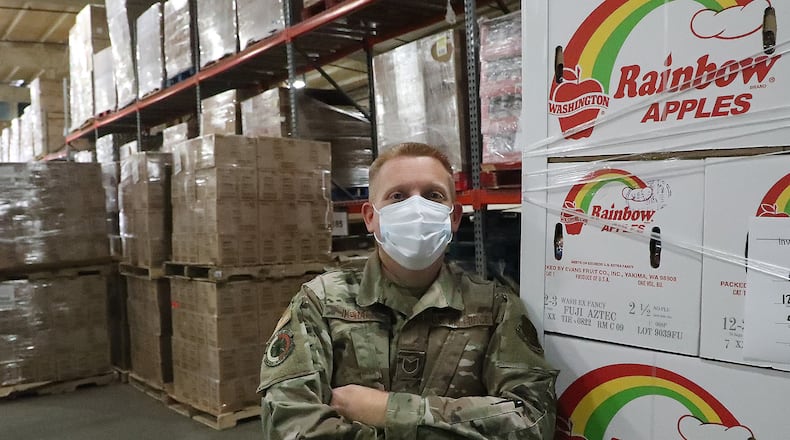About 100 days into his deployment at the Second Harvest Food Bank of Clark, Champaign and Logan Counties, the 48-year old Ingram is taking full advantage of what he calls the “rare opportunity” to help the community he serves.
Not long after the COVID-19 pandemic took hold, Ingram, assigned to the 178th Wing’s Intelligence, Surveillance and Reconnaissance Group at the Springfield Air National Guard Base, starting hoping for a chance to be part of the response.
I didn’t want to sit at home,” which is in Clearcreek Township south of Dayton, he said. “I wanted to participate to get us over the hump of this.” So, when the email about the assignment arrived at the Springfield base, Ingram, who was working an additional training day, got the word right away.
A Franklin High School graduate, Ingram served on active duty with the Air Force from 1992-99, finishing as crew chief on a KC-135 air refueling plane. He calls his decision to separate from the service in 2000 “one of the toughest choices in my life.”
But six years into marriage with his high school sweetheart, Nicole, and with two young children, “I took the leap.”
Betting that people in Dayton would love the smoothies that were popular in Tampa, his last duty location, he refined his favorite recipes, borrowed money against his house and opened a shop in the Dayton Mall.
That and a second location, he said, have “provided very well for my family.”
When his son, Austin, now 22, announced three years ago that he would join the Air Force, it sparked a conversation that led Ingram to enlist in the Air National Guard. Soon the two had the opportunity to serve in the same unit.
(Austin is now attending the University of Cincinnati full time and intends to become an officer.)
Meanwhile, his father has focused on another institution.
Reorganized Jan. 1 with a local board, the food bank was stretching itself to address a food desert that opened on Springfield’s South Side when the pandemic hit.
The result was a huge increase in the demand, which led Gov. Mike DeWine to send in the National Guard, and a ranking Air Force officer assigned Ingram to learn the operation.
Warehousing, alley distributions, mobile foodbanks, residential deliveries – the challenge was to help the organization do what those in the armed services always must do in the face of a challenge: adapt and overcome.
While familiarizing himself with the organization, Ingram also met the people it was serving, finding service to seniors and people with disabilities “probably the most interesting.”
There was elderly Mr. K., who had never received help before and “was in a real desperate situation.”
As moved as Mr. K was to receive help, Ingram and others were equally moved by both the depth of his need and his emotional response.
“Crying,” said Ingram, “is contagious.”
Another memorable visit was to a woman near Indian Lake, a COVID patient who had been on a ventilator, had been unhappy with her hospital visit and, being isolated, “told us her whole story, believe me,” Ingram said.
“She looked forward to that visit,” he said, although not as much as she’s looking forward to returning to the buffets at her favorite casinos.
In working side-by-side with an Army National Guard unit, Ingram learned something else: Never to call a sergeant on duty ma’am – regardless of gender.
“She was very nice about it” and said he was welcome to greet her that way while she was off duty, Ingram said, but never again while she was on duty.
Once he had been schooled, Ingram filled an open position in the food bank’s front office.
“This part’s the most challenging,” he said.
It has involved:
- Creating and continually adjusting delivery routes to best serve the most needy with a limited number of trucks and staff available.
- Preserving the integrity of that program by teaching people who can make it to the food bank that there are more options for them and often more food available there.
- Bringing a new screening tool on line with a new computer system that it required.
- Forming working partnerships with Clark County Sheriff’s Department and the United Way to meet both the food and non-food needs of the people the food bank serves.
Ingram said he has been “super-excited” to forge those partnerships. Doing so has helped him to overcome the “personal frustration” of seeing people in need and not knowing how to help them – followed by the satisfaction of working with others to meet the need.
“Connecting the dots” that will allow a woman in a wheelchair with a broken ramp to get a new one and handing a United Way brochure to a man desperate for help have put Ingram in more situations where crying is contagious.
“It’s a blessing and an and honor and a privilege to learn in this capacity,” he said.
And the lessons he has learned in leadership – “that nothing’s going to be perfect and we’re always learning where we can improve” – has him looking to the future.
While it “depends on what comes along,” Ingram said, he’s thinking about stretching his National Guard duty for another dozen years to have the opportunity to help people in more ways.
When Call of Duty: Food Bank is over, Ingram is likely to be looking for another way to serve.
About the Author
